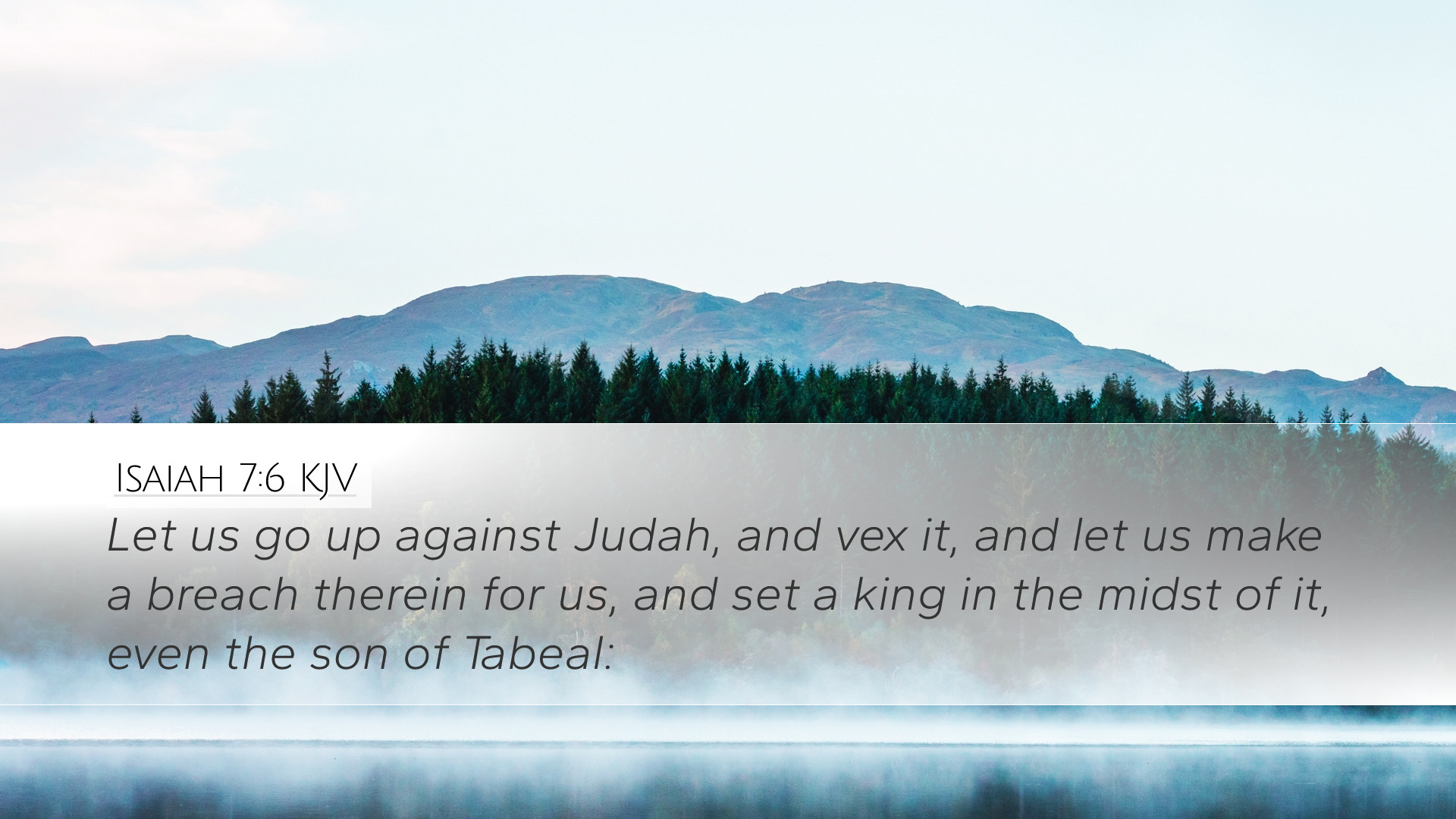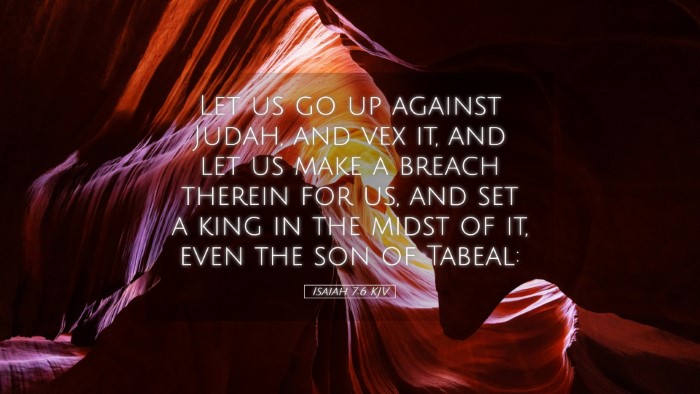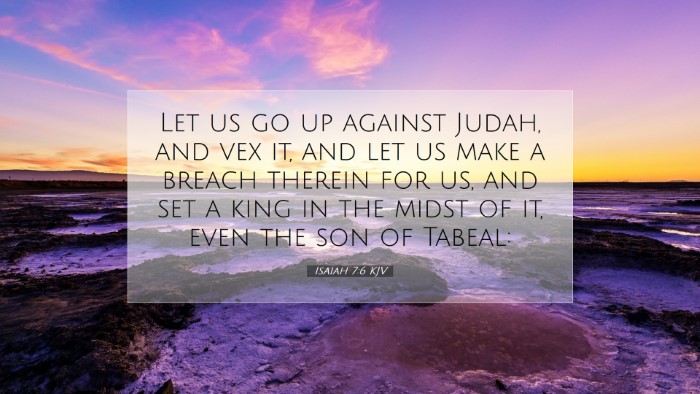Commentary on Isaiah 7:6
Verse: "Let us go up against Judah and terrify it, and let us conquer it for ourselves, and set up the son of Tabeel as king in the midst of it."
Introduction
Isaiah 7:6 provides a glimpse into the tumultuous period of Judah's history, marked by external threats and political intrigue. This verse encapsulates the conspiracy of the kings of Israel and Syria against Judah, revealing the distress and fear that enveloped King Ahaz and the people of Judah. Understanding this verse requires a deep dive into its context, prophetic significance, and the theological implications it holds.
Historical Context
The events surrounding Isaiah 7:6 occur during the reign of King Ahaz of Judah, who ruled in the 8th century BCE. During this time, the northern kingdom of Israel had formed an alliance with Aram (Syria) against Judah, seeking to undermine Ahaz's rule by installing a puppet king. This political maneuvering is pivotal as it reflects the fragile alliances and enmities that characterized the era.
Commentary Insights
Matthew Henry's Perspective
Matthew Henry points out that the plot against Judah emphasizes the inadequacy of human schemes against the sovereign plan of God. He notes that the intention of the kings to "terrify" Judah was not merely to conquer but to instill fear and create chaos. This serves as a reminder of the futility of opposing God's chosen people and the divine protection that surrounds them. Henry suggests that rather than succumb to fear, the people of God ought to rely on divine promises and remain steadfast in faith.
Albert Barnes' Commentary
Albert Barnes elaborates on the political implications of the verse, highlighting the use of terror as a strategy in ancient warfare. He emphasizes the seriousness of the threat posed by Israel and Syria and the urgency with which they sought to dismantle Judah's defenses. Barnes notes the mention of "the son of Tabeel" as a prospective puppet king, suggesting the degree to which foreign powers would go to control Judah. This reference underlines a critical theological theme: the danger of allowing political expediency to undermine spiritual integrity. Barnes further emphasizes that true confidence should come not from military might but from reliance on God's assurances.
Adam Clarke's Analysis
Adam Clarke provides a detailed interpretation of the phrase "let us go up against Judah." He identifies it as indicative of a full-scale attack, symbolic of a direct challenge to the sovereignty of Judah. Clarke also observes the personal and communal fear that such a threat would elicit within the kingdom. He stresses the idea that despite human attempts to disrupt the covenant community, God's intentions for His people will ultimately prevail. Clarke's insights prompt readers to contemplate the intersection of faith and fear, illustrating the profound need for trust in God amidst overwhelming odds.
Theological Implications
The conspiracy against Judah carries significant theological weight, revealing the persistent struggle between faithfulness to God's covenant and external pressures. This verse illustrates a recurring biblical theme: the struggle of God's people against forces that seek to undermine their identity and mission. The political alliance of Israel and Syria can be seen as a representation of the broader spiritual conflict where faith is tested through adversity.
Divine Sovereignty
A key element of this passage is the affirmation of divine sovereignty in the face of human opposition. Despite the calculated plans of the adversaries, God remains in control of the historical narrative. This emerges as a source of hope for believers, reminding them that no earthly power can thwart God's purposes. The prophetic insights provided through Isaiah serve to reassure Judah of God's promise, which ultimately points to the coming of the Messiah.
Faith versus Fear
Ahaz's fear is palpable against the backdrop of this conspiracy. Rather than trusting in God's warnings delivered by Isaiah, his inclination towards alliances and visible solutions serves as a cautionary tale. Christians today may reflect on similar tendencies to rely on human solutions during times of crisis rather than seeking divine guidance. The challenge remains to cultivate a faith that exceeds fear, encouraging theological reflection on God’s faithfulness in perilous times.
Application for Today
Isaiah 7:6 serves as a profound teaching tool for pastors, students, and theologians. It urges the community of faith to recognize the spiritual battles that persist in all generations. Believers are encouraged to:
- Trust in God's Sovereignty: Understanding that God is aware of the threats we face, whether they be spiritual, social, or political.
- Acknowledge Fear: Recognizing that fear is a natural response, yet it should not dictate our actions or beliefs. Like Ahaz, we must wrestle with fear but seek faith over fear.
- Invite Prophetic Voices: Emissaries of God, like Isaiah, remind us of divine truths amidst chaos. Engaging with scripture helps anchor our minds and hearts in God's promises.
- Seek Spiritual Integrity: Guarding against the temptation to compromise our faith and values for the sake of worldly security, just as Ahaz was tempted to form ungodly alliances.
Conclusion
Isaiah 7:6 casts a significant light upon the nature of human conflict, the allure of political solutions, and the overarching sovereignty of God. Through the insights drawn from the commentaries of Matthew Henry, Albert Barnes, and Adam Clarke, readers are tasked with reflecting critically on their responses to fear and uncertainty. Ultimately, this verse invites believers into deeper faith, reminding them of the omnipresent assurance that God remains active in the affairs of His people, guiding them through turmoil to victory.


